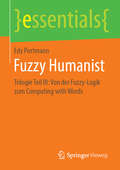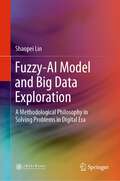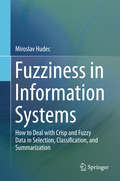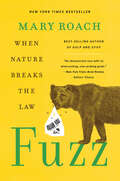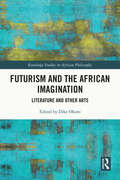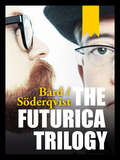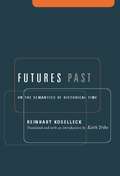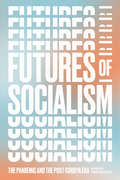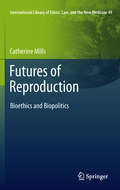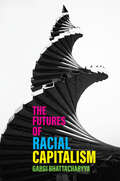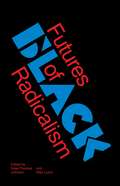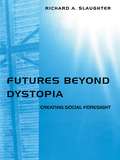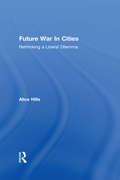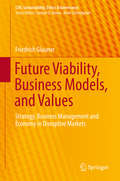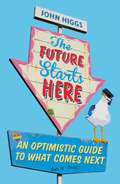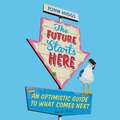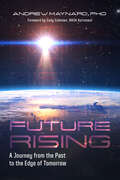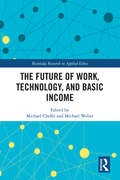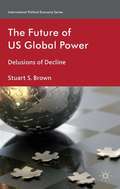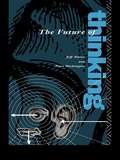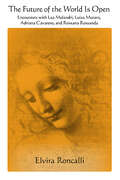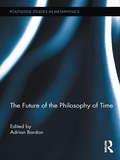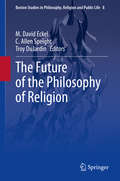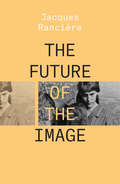- Table View
- List View
Fuzzy Humanist: Trilogie Teil III: Von der Fuzzy-Logik zum Computing with Words (essentials)
by Edy PortmannAuch mit Worten, Phrasen, Präpositionen, Fragen sowie anderen semantischen Einheiten der natürlichen Sprache ist es möglich, zu rechnen. Daher ist diese Methode für einen Einsatz im Sinne des Humanismus prädestiniert. Edy Portmann erläutert den Zusammenhang von Fuzzy-Logik und dem Rechnen mit Worten und zeigt daran den Unterschied zwischen heutigen Suchmaschinen sowie zukünftigen Frage-Antwort-Systemen auf. Er legt dar, wie das Rechnen mit Worten als Grundlage einer Mensch-Maschine-Symbiose dient, die in kollektiver (urbaner) Intelligenz mündet. Als Ausblick weist der Autor darauf hin, wie Computing with Words zur Schaffung von kollektiver Intelligenz beitragen kann.Der Autor:Prof. Dr. Edy Portmann ist Swiss Post Professor of Computer Science am Human-IST Institut der Universität Fribourg, Schweiz. In seiner Forschung beschäftigt er sich mit Fragen rund um Informationssysteme, -verarbeitung und -beschaffung.
Fuzzy-AI Model and Big Data Exploration: A Methodological Philosophy in Solving Problems in Digital Era
by Shaopei LinBased on the idea of a universal rule for problem solving, the book suggests that the “System-Fuzzy Approach (SFA)” Model can be applied to various complex real-world problems. It is the first book for problem solving in complicated problems with a universal project management tool. Systematic searching is an essential step in identifying the right direction in problem solving; and the fuzzy steps in concrete problem solving reflect the flexibility and compromises involved in the process. Nevertheless, the fuzzy steps also demonstrate human beings’ impressively flexible problem-solving skills. Simulating human decision-making processes based on fuzzy information processing is essential in our digital era, in which many problems need to be solved by means of artificial intelligence; hence the Fuzzy-AI Model emerged. As a universal rule and tool, it can be applied to a broad range of real-world problems. Offering a valuable guide to fuzzy decision-making, this book is intended for researchers, scientists and graduate students in the fields of Engineering, Economics, Sociology, Managerial Science, Project Management etc.
Fuzziness in Information Systems
by Miroslav HudecThis book is an essential contribution to the description of fuzziness in information systems. Usually users want to retrieve data or summarized information from a database and are interested in classifying it or building rule-based systems on it. But they are often not aware of the nature of this data and/or are unable to determine clear search criteria. The book examines theoretical and practical approaches to fuzziness in information systems based on statistical data related to territorial units. Chapter 1 discusses the theory of fuzzy sets and fuzzy logic to enable readers to understand the information presented in the book. Chapter 2 is devoted to flexible queries and includes issues like constructing fuzzy sets for query conditions, and aggregation operators for commutative and non-commutative conditions, while Chapter 3 focuses on linguistic summaries. Chapter 4 presents fuzzy logic control architecture adjusted specifically for the aims of business and governmental agencies, and shows fuzzy rules and procedures for solving inference tasks. Chapter 5 covers the fuzzification of classical relational databases with an emphasis on storing fuzzy data in classical relational databases in such a way that existing data and normal forms are not affected. This book also examines practical aspects of user-friendly interfaces for storing, updating, querying and summarizing. Lastly, Chapter 6 briefly discusses possible integration of fuzzy queries, summarization and inference related to crisp and fuzzy databases. The main target audience of the book is researchers and students working in the fields of data analysis, database design and business intelligence. As it does not go too deeply into the foundation and mathematical theory of fuzzy logic and relational algebra, it is also of interest to advanced professionals developing tailored applications based on fuzzy data.
Fuzz: When Nature Breaks the Law
by Mary RoachAn Instant New York Times Bestseller #1 Los Angeles Times Bestseller #1 Indie Hardcover Nonfiction Bestseller A Publishers Weekly Best Nonfiction Book of 2021 Longlisted for the 2022 Andrew Carnegie Medal for Excellence in Nonfiction Join "America’s funniest science writer" (Peter Carlson, Washington Post), Mary Roach, on an irresistible investigation into the unpredictable world where wildlife and humans meet. What’s to be done about a jaywalking moose? A bear caught breaking and entering? A murderous tree? Three hundred years ago, animals that broke the law would be assigned legal representation and put on trial. These days, as New York Times best-selling author Mary Roach discovers, the answers are best found not in jurisprudence but in science: the curious science of human-wildlife conflict, a discipline at the crossroads of human behavior and wildlife biology. Roach tags along with animal-attack forensics investigators, human-elephant conflict specialists, bear managers, and "danger tree" faller blasters. Intrepid as ever, she travels from leopard-terrorized hamlets in the Indian Himalaya to St. Peter’s Square in the early hours before the pope arrives for Easter Mass, when vandal gulls swoop in to destroy the elaborate floral display. She taste-tests rat bait, learns how to install a vulture effigy, and gets mugged by a macaque. Combining little-known forensic science and conservation genetics with a motley cast of laser scarecrows, langur impersonators, and trespassing squirrels, Roach reveals as much about humanity as about nature’s lawbreakers. When it comes to "problem" wildlife, she finds, humans are more often the problem—and the solution. Fascinating, witty, and humane, Fuzz offers hope for compassionate coexistence in our ever-expanding human habitat.
Futurism and the African Imagination: Literature and Other Arts (Routledge Studies in African Philosophy)
by Dike OkoroThis book investigates how African authors and artists have explored themes of the future and technology within their works. Afrofuturism was coined in the 1990s as a means of exploring the intersection of African diaspora culture with technology, science and science fiction. However, this book argues that literature and other arts within Africa have always reflected on themes of futurism, across diverse forms of speculative writing (including science fiction), images, spirituality, myth, magical realism, the supernatural, performance and other forms of oral resources. This book reflects on themes of African futurism across a range of literary and artistic works, also investigating how problems such as racism, sexism, social injustice and postcolonialism are reflected in these narratives. Chapters cover authors, artists, movements and performers such Wole Soyinka, Ben Okri, Ngugi wa Thiong’o, Elechi Amadi, Mazisi Kunene, Nnedi Okorafor, Lauren Beukes, Leslie Nneka Arimah and the New African Movement. The book also includes a range of original interviews with prominent authors and artists, including Tanure Ojaide, Lauren Beukes, Patricia Jabbeh Wesley, Benjamin Kwakye, Ntongela Masilela and Bruce Onobrakpeya. Interdisciplinary in its approach, this book will be an important resource for researchers across the fields of African literature, philosophy, culture and politics.
The Futurica Trilogy
by Alexander Bard Jan SöderqvistIn the late 1990's, Swedish social theorists Alexander Bard and Jan Söderqvist started working on a radical new theory, since referred to as The Netocracy Hypothesis. At this early stage Bard & Söderqvist foresaw that the control of the internet would be the subject of the main power struggle for the next century.
Futures Past: On the Semantics of Historical Time (Studies In Contemporary German Social Thought)
by Reinhart KoselleckModernity in the late eighteenth century transformed all domains of European life -intellectual, industrial, and social. Not least affected was the experience of time itself: ever-accelerating change left people with briefer intervals of time in which to gather new experiences and adapt. In this provocative and erudite book Reinhart Koselleck, a distinguished philosopher of history, explores the concept of historical time by posing the question: what kind of experience is opened up by the emergence of modernity? Relying on an extraordinary array of witnesses and texts from politicians, philosophers, theologians, and poets to Renaissance paintings and the dreams of German citizens during the Third Reich, Koselleck shows that, with the advent of modernity, the past and the future became 'relocated' in relation to each other.The promises of modernity -freedom, progress, infinite human improvement -produced a world accelerating toward an unknown and unknowable future within which awaited the possibility of achieving utopian fulfillment. History, Koselleck asserts, emerged in this crucial moment as a new temporality providing distinctly new ways of assimilating experience. In the present context of globalization and its resulting crises, the modern world once again faces a crisis in aligning the experience of past and present. To realize that each present was once an imagined future may help us once again place ourselves within a temporality organized by human thought and humane ends as much as by the contingencies of uncontrolled events.
Futures Past: On the Semantics of Historical Time
by Keith Tribe Reinhart KoselleckWith a new, interpretive introduction by the translator, this revised edition of Koselleck's most acclaimed work is once again available in English. Koselleck explores the concept of historical time by posing the question: What kind of experience is opened up by the emergence of modernity? Koselleck explores the concept of historical time by posing the question: what kind of experience is opened up by the emergence of modernity?
Futures of Socialism: The Pandemic and the Post-Corbyn Era
by Grace BlakeleyHow should the left respond to electoral defeat, the leadership of Keir Starmer and a global crisis?British politics is in an extraordinary place. Grace Blakeley introduces an indispensable collection of analysis and comment. In Futures of Socialism, Sam Gindin and James Meadway reassess socialist strategy after the coronavirus; Dalia Gebrial and Siân Errington debate austerity and precarity; Joshua Virasami and Simukai Chigudu explore anti-racism and the legacy of Empire; and Leo Panitch and Momentum co-founder James Schneider probe the limits of parliamentary socialism. Chris Saltmarsh assesses the prospects for an eco-socialist Green New Deal and Cat Hobbs argues for the ongoing centrality of public ownership to socialist policy. Futures of Socialism takes an in-depth look at the reasons for Labour&’s 2019 election defeat, with Unite&’s Andrew Murray on Labour&’s Brexit position, Tom Mills on the British media, Gargi Bhattacharyya and Jeremy Gilbert on better ways to build a political project, and Keir Milburn on generation left. The anthology also compares the fortunes of the British left with socialist movements overseas, in despatches from Europe and America. Blakeley draws on the talents of all sections of the post-Corbyn left to survey the prospects of &“a movement that has dominated the horizons of our lives.&”
Futures of Reproduction
by Catherine MillsIssues in reproductive ethics, such as the capacity of parents to 'choose children', present challenges to philosophical ideas of freedom, responsibility and harm. This book responds to these challenges by proposing a new framework for thinking about the ethics of reproduction that emphasizes the ways that social norms affect decisions about who is born. The book provides clear and thorough discussions of some of the dominant problems in reproductive ethics - human enhancement and the notion of the normal, reproductive liberty and procreative beneficence, the principle of harm and discrimination against disability - while also proposing new ways of addressing these. The author draws upon the work of Michel Foucault, especially his discussions of biopolitics and norms, and later work on ethics, alongside feminist theorists of embodiment to argue for a new bioethics that is responsive to social norms, human vulnerability and the relational context of freedom and responsibility. This is done through compelling discussions of new technologies and practices, including the debate on liberal eugenics and human enhancement, the deliberate selection of disabilities, PGD and obstetric ultrasound.
The Futures of Racial Capitalism
by Gargi BhattacharyyaCapitalism appears to be endlessly in crisis but without ever loosening its hold on our lives. New modes of racism and exclusion emerge, but the old ones never go away. We continue to struggle to live and survive in its wake but are unable, still now, to build commonality with each other. In this incisive book, Gargi Bhattacharyya revisits debates about racial capitalism and its violence through differentiation. Taking the four lenses of prisons, borders, debt and platforms, Bhattacharyya reveals how this moment of capitalist crisis positions humans as expendable, but differentially so, in a process that remakes longstanding racialized hierarchies. Uncovering practices and techniques embedded in the shifting processes of accumulation and state power, the chapters illuminate how value is extracted from populations through non-wage routes and indebtedness. This engaging introduction to racial capitalism offers an interlocking and insightful analysis of capitalist renewal, essential for students and scholars interested in issues of race, racism and inequality.
Futures of Black Radicalism
by Alex Lubin Gaye Theresa JohnsonWith racial justice struggles on the rise, a probing collection considers the past and future of Black radicalismBlack rebellion has returned. Dramatic protests have risen up in scores of cities and campuses; there is renewed engagement with the history of Black radical movements and thought. Here, key intellectuals—inspired by the new movements and by the seminal work of the scholar Cedric J. Robinson—recall the powerful tradition of Black radicalism while defining new directions for the activists and thinkers it inspires. In a time when activists in Ferguson, Palestine, Baltimore, and Hong Kong immediately connect across vast distances, this book makes clear that new Black radical politics is thoroughly internationalist and redraws the links between Black resistance and anti-capitalism. Featuring the key voices in this new intellectual wave, this collection outlines one of the most vibrant areas of thought today. With contributions from Greg Burris, Jordan T. Camp, Angela Davis, Ruth Wilson Gilmore, Avery F. Gordon, Stefano Harney, Christina Heatherton, Robin D.G. Kelley, George Lipsitz, Fred Moten, Paul Ortiz, Steven Osuna, Kwame M. Phillips, Shana L. Redmond, Cedric J. Robinson, Elizabeth P. Robinson, Nikhil Pal Singh, Damien M. Sojoyner, Darryl C. Thomas, and Françoise Vergès.
Futures Beyond Dystopia: Creating Social Foresight (Futures In Education Ser.)
by Richard A. SlaughterHow can dystopian futures help provide the motivation to change the ways we operate day to day?Futures Beyond Dystopia takes the view that the dominant trends in the world suggest a long-term decline into unliveable Dystopian futures. The human prospect is therefore very challenging, yet the perception of dangers and dysfunctions is the first step towards dealing with them. The motivation to avoid future dangers is matched by the human need to create plans and move forward. These twin motivations can be very powerful and help to stimulate the fields of Futures Studies and Applied Foresight.This analysis of current Futures practice is split into six sections:* The Case Against Hegemony* Expanding and Deepening a Futures Frame* Futures Studies and the Integral Agenda* Social Learning through Applied Foresight* Strategies and Outlooks* The Dialectic of Foresight and Experience.This fascinating book will stimulate anyone involved in Futures work around the world and will challenge practitioners and others to re-examine many of their assumptions, methodologies and practices.
Future War In Cities: Rethinking a Liberal Dilemma
by Alice HillsThis book is the first full-length study of a key security issue confronting the west in the twenty-first century, urban military operations - as currently being undertaken by US and UK forces in Iraq. It relates military operations in cities to the wider study of conflict and security in an era of urbanisation, expeditionary warfare and new power
Future Viability, Business Models, and Values: Strategy, Business Management and Economy in Disruptive Markets (CSR, Sustainability, Ethics & Governance)
by Friedrich GlaunerThis book challenges the traditional models of modern economy, business education and management, which are devoted to the concepts of scarcity, competition, growth and yield. It deconstructs the spiral of acceleration in which technological shifts concerning global markets and enterprises produce a dynamic of unbridled disruption, concentration and erosion of human and natural resources. The book analyzes how, in the face of this dynamic, once successful business models increasingly lead to existential jeopardy.The book embeds its argument in the impact of technological change on strategy in general. It subsequently analyzes the degree of rationality in the strategy building process to juxtapose revenue and responsibility as the fundamental principles of diverging strategic concepts. In its central chapters the book explores the benefits of consciousness-driven business models and value-added strategies for the awareness markets of the future and their impact on team excellence and resource handling. It develops an understanding of how corporations can function as ecosystems – fostering the growth and development of the resources they operate on, rather than being based on their exploitation. Understanding this structure of viable future business models is the overall theme of this pioneering book.“This book endeavors to set out yet another paradigm for a viable economics, the paradigm of ethicology. It seeks to replace the concepts of competition, scarcity and growth with strategies and business models based on resource creation, added values cycles, enrichment and symbiosis in line with the awareness economy it describes.” Hunter Lovins,President and Founder of Natural Capitalism Solutions “... a very basic paradigm shift in our future strategies …” Henner Klein, Chairman Emeritus A.T. Kearney “The book stands right on the tectonic fault line between our old and our new reality. It manages to do both: analyze the shifting paradigms and provoke new thinking.” Dr. Martin R. Stuchtey, Director of the McKinsey Center for Business & Environment “This book is raising the bar. His vision dares to rethink the principles of the liberal and social market economy in a globalized business world.” Prof. Dr. René Schmidpeter, CBS Köln “A book worth reading and reflecting on. Onwards to an economy that works for 100% of humanity.” Michael Pirson,Associate Professor, Director Center for Humanistic Management, Fordham University and Research Fellow, Harvard University „ … powerful arguments and practical guidance on how companies can become sustainable and live up to the realities of global enterprise …” Michael Hilti, Hilti AG
The Future Starts Here: An Optimistic Guide to What Comes Next
by John HiggsWhen we look into the future, we imagine economic collapse, environmental disaster and the zombie apocalypse. But what if we are wrong? John Higgs takes us on a journey past the technological hype and headlines to discover why we shouldn't trust the predictions of science fiction, why nature is not as helpless as we assume and why purpose can never be automated. In the process, we will come to a better understanding of what lies ahead and how, despite everything we can build a better future.
The Future Starts Here: An Optimistic Guide to What Comes Next
by John HiggsAt some point in the 1980s we gave up on the future. Before then, we imagined wonderful days to come, free from disease, work and want, in television series like Star Trek or events such as the 1939 Futurama World Fair. When we look ahead now, we tell dystopian stories of environmental collapse, zombie plagues and the end of civilisation. If it is true that we have to imagine the future before we build it, then this is deeply worrying.There are of course good reasons for this bleak outlook. Serious environmental and societal problems are building, most notably climate change, inequality and population demographics. These will be accompanied by technological advances, including artificial intelligence and biotechnology, which will amplify the rate of change and make the future increasingly unstable and unpredictable.But it is not just technology that is changing. We are changing too. The postmodern world is evolving into a metamodern one. In the metamodern world concepts previously shunned, such as meaning, purpose and sincerity, return not as absolute truths but as necessary tools. While the postmodern world view was detached, cynical and frequently pessimistic, the metamodern is naturally more optimistic. If we engage with the problems of the world, we can overcome them. John Higgs takes us on a journey to find the individuals who are engaging with the changes that are coming, and through that engagement finding their own sense of purpose. As a result, the characters we meet along the way will not be titans of industry or world-renowned experts, but rather regular people who were curious about new technology and who have begun exploring its potential in ways that are meaningful to them. Through their stories, we will come to understand what this much-hyped new technology can and can't do, in order to see past the hype and headlines. In the process, we will come to a better understanding of what lies ahead and how, despite everything - despite all the horrors and instability we face - we can imagine a future worth building.(p) Orion Publishing Group Ltd 2019
Future Rising: A Journey from the Past to the Edge of Tomorrow (Analyzing The Future Ser.)
by Andrew MaynardA scientist offers compelling visions and potential pitfalls of the future—in &“a journey through time, space, and the human experience&” (Dr. Tanya Harrison, coauthor of For All Humankind). Humanity has gained the ability not only to imagine the future, but to design and engineer it. At times entertaining, and at others profound, Future Rising provides an original perspective on our relationship with the future. As a species, we&’ve become talented architects of our future—yet we often struggle to come to terms with what this means. As innovation and rapidly shifting norms and expectations drive our world at breakneck speed, we sometimes need to find a still, quiet place to pause and think. Future Rising creates such a place, where we can take advantage of our species&’ knowledge of world history and the importance of science to piece together a positive future. To create a good future, we must rediscover the past. Our relationship with the future is inextricably intertwined with where we&’ve come from, who we are, and what we aspire to. Future Rising starts at the beginning of all things with the Big Bang and traces a pathway along the emergence of intelligent life, through what makes humans uniquely capable of imagining and creating different futures. In a series of sixty short reflections, Andrew Maynard, a former physicist and nationally recognized expert in technology and society, will take you on a journey into: What &“the future&” actually isHow it molds and guides our livesHow we can use the history of the world to change our future &“A thoughtful and thought-provoking response to the moment we&’re in, chronicling how we got here, where we&’re going, and what role we have in that journey.&” —Ramona Pringle, Director of Creative Innovation Studio and Associate Professor, Ryerson University
The Future of Work, Technology, and Basic Income (Routledge Research in Applied Ethics)
by Michael Cholbi Michael WeberTechnological advances in computerization and robotics threaten to eliminate countless jobs from the labor market in the near future. These advances have reignited the debate about universal basic income. The essays in this collection offer unique and compelling perspectives on the ever-changing nature of work and the plausibility of a universal basic income to address the elimination of jobs from the workforce. The essays address a number of topics related to these issues, including the prospects of libertarian and anarchist justifications for a universal basic income, the positive impact of a basic income on intimate laborers such as sex workers and surrogates, the nature of "bad work" and who will do it if everyone receives a basic income, whether a universal basic income is objectionably paternalistic, and viable alternatives to a universal basic income. This book raises complex questions and avenues for future research about universal basic income and the future of work in our increasingly technological society. It will be of keen interest to graduate students and scholars in political philosophy, economics, political science, and public policy who are interested in these debates.
The Future of US Global Power
by Stuart S. BrownDispelling the myth of decline, Stuart Brown argues that the US continues to enjoy the economic, political, cultural and military underpinnings befitting a pre-eminent global power. He provides an analytical tour through the major domestic and foreign policy issues that will impact the United States' future position and role in the global system.
The Future of Thinking: Rhetoric and Liberal Arts Teaching
by Peter Washington Ga* Jeff MasonLearning to think is a complex process made up of reading, writing listening, speaking and remembering textual materials. The aim of this topical book is to encourage practical educational reform in the Humanities by taking the emphasis away from the reception of texts to their production. Adapting rhetorical teaching methods, the authors encourage students to participate in the activities of thinking giving them short written and verbal exercises to develop conceptual competences and linguistics skills. It is argued that these methods can be implemented successfully across a wide number of humanities subjects and that they encourage the development of practical transferable skills, both cognitive and linguistic.The authors have used these methods successfully in class, and the book includes sample exercises, the initial results, and feedback from their students.
The Future of the World Is Open: Encounters with Lea Melandri, Luisa Muraro, Adriana Cavarero, and Rossana Rossanda (SUNY series in Contemporary Italian Philosophy)
by Elvira RoncalliThe Future of the World Is Open examines the work and thought of three prominent Italian feminist philosophers, Lea Melandri, Luisa Muraro, and Adriana Cavarero, as it delves into the significant experiences that shaped them, highlighting their converging and diverging positions. Also appearing here for the first time in English translation are three essays by renowned author, journalist, and political figure Rossana Rossanda. Rossanda's essays offer a critical perspective on some of the contentious theoretical nodes with which Italian feminist thought has wrestled. Written in terse and engaging language, this book explores challenging philosophical and political questions, with themes including masculine domination; the body as the site of sedimented lived experience; sexual difference; the symbolic; the imaginary; feminine political authority; feminine subjectivity; and material humanism. A vivid picture of the socio-political context of Italian feminism emerges—illuminating its strong commitment to practice—and informing and enriching contemporary discussions at the intersection of different disciplinary perspectives.
The Future of the Philosophy of Time (Routledge Studies in Metaphysics)
by Adrian BardonThe last century has seen enormous progress in our understanding of time. This volume features original essays by the foremost philosophers of time discussing the goals and methodology of the philosophy of time, and examining the best way to move forward with regard to the field's core issues. The collection is unique in combining cutting edge work on time with a focus on the big picture of time studies as a discipline. The major questions asked include: What are the implications of relativity and quantum physics on our understanding of time? Is the passage of time real, or just a subjective phenomenon? Are the past and future real, or is the present all that exists? If the future is real and unchanging (as contemporary physics seems to suggest), how is free will possible? Since only the present moment is perceived, how does the experience as we know it come about? How does experience take on its character of a continuous flow of moments or events? What explains the apparent one-way direction of time? Is time travel a logical/metaphysical possibility?
The Future of the Philosophy of Religion (Boston Studies in Philosophy, Religion and Public Life #8)
by M. David Eckel C. Allen Speight Troy DuJardinThis collection of essays on the philosophy of religion and its future brings together accomplished thinkers across several related fields, from comparative philosophy to analytic and continental philosophy of religion and beyond. Contributing authors address pressing questions including: Where does philosophy stand in relation to religion and the study of religion in the 21st century? How ought the philosophy of religion to interact with religious studies and theology to make for fruitful interdisciplinary engagement? And what does philosophy uniquely have to offer to the broad discourse on religion in the modern world? Through exploring these questions and more, the authors’ goal is not that of meeting the philosophical future, but of forging it. Readers will enter a vivid conversation through engaging essays which demonstrate the importance of disciplinary openness and show that we do not need to sacrifice depth in order to achieve breadth. Modernity and postmodernity come together in a constantly evolving discussion that moves the philosophy of religion forward, while keeping an eye toward the experience accumulated in past centuries. This book will interest students of philosophy, theology, religious studies, and other fields that wonder about the place of philosophy and religion in today’s world. It also has much to offer advanced scholars in these fields, through its breadth and forward thinking.
The Future of the Image
by Jacques RanciereLauded by major contemporary artists and philosophers, Jacques Rancière’s work returns politics to its central place in understanding art. In The Future of the Image,Jacques Rancière develops a fascinating new concept of the image incontemporary art, showing how art and politics have always beenintrinsically intertwined. Covering a range of art movements, filmmakers such as Godard and Bresson, andthinkers such as Foucault, Deleuze, Adorno, Barthes, Lyotard andGreenberg, Rancière shows that contemporary theorists of the image aresuffering from religious tendencies.He argues that there is a starkpolitical choice in art: it can either reinforce a radical democracy,or create a new reactionary mysticism. For Rancière there is never apure art: the aesthetic revolution must always embrace egalitarianideals.
